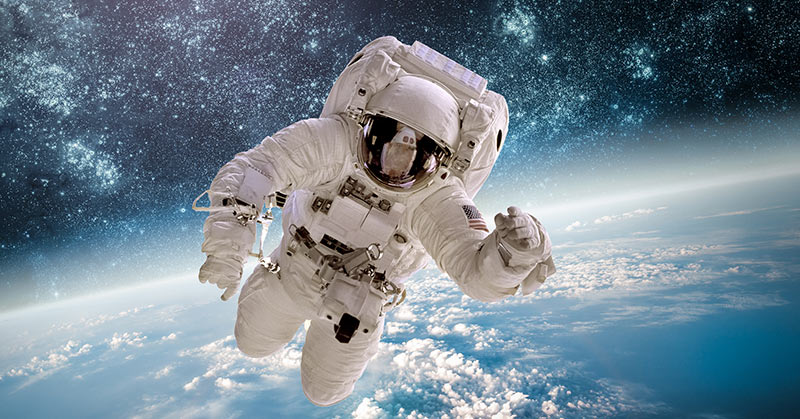We have been sending both animals and humans alike into space for decades to help us discover and understand more about the fascinating solar system that surrounds us. But scientists want to learn about more than just the stars and planets.
One of the most prominent questions scientists are asking is: “What happens to the human body in space?” [1]
Within the earth’s atmosphere, gravity acts on our bodies and affects everything from blood flow, to bone density, to even our eyesight. But what happens when we are no longer subjected to its pull?
An Alarming Discovery
As mentioned above, astronauts are not sent into space just to study stars and planets. They are also there to act as test subjects to assess the effect of zero gravity on the human body.
In a recent study carried out by NASA, an unexpected and alarming discovery was found in one of the astronauts: a blood clot [2].
Before the astronauts leave Earth, they undergo several tests to measure vitals, draw blood, and swab cheeks [2]. An astronaut was giving themselves an ultrasound when they found a blood clot. This clot had not been present before exiting Earth’s atmosphere [2].
A Brief History of Space Experimentation
No one knew what would happen to the human body during space travel, and some physicians were worried that without gravity, basic functions like swallowing and pumping blood to the heart would be impossible [3].
So what did they do? They sent animals first. The Russians used dogs and Americans used monkeys and chimpanzees [3].
Bill Britz, an American veterinarian who worked with chimpanzees who flew into space in the 1960s explained: “We take for granted now that animals and humans can function in space, but back then we knew absolutely nothing,” [3].
The training for these animals was quite rigorous, and would probably be labeled as animal abuse by today’s standards. Both the Soviets and the Americans stopped these animal studies in the 1960s, however, scientists do continue to send animals into space alongside humans as research proxies [3].
What Does Space do to the Body?
In 2015-2016, NASA conducted a unique experiment involving two astronauts: twin brothers Scott and Mark Kelly [4].
Scott Kelly spent one year in orbit, while his identical twin brother, Mark, stayed on Earth. Researchers wanted to find out what would happen to Scott’s body at the molecular level with Mark as the control group [5].
The study found that Scott’s DNA did not fundamentally change, however, he did experience changes in gene expression, which is how your body reacts to the environment [5].
What else did we learn from Scott’s expedition? The human body doesn’t really like space travel [4].
Without gravity, fluids, such as blood, float around freely, clog your sinuses and make your face appear puffy. Since they no longer have to bear weight, bones start to thin and muscles start to atrophy. Even parts of your eyes start to become squished or swollen [4].
When you are in space, your body is also exposed to much higher levels of radiation than on Earth, putting you at a higher risk for cancer [4].
In the case of Scott Kelly, most of the changes he experienced during his year in space went back to normal upon returning to Earth. Interestingly, 93% of his genes also returned to normal, leaving 7% that appear to be permanently changed. This is being referred to by scientists as “the space gene” [5].
Back to the Blood Clot
So what’s the big deal about this blood clot? The main concern is that this has not been observed in any astronaut before, and so the consequences are as of yet unknown [2]. This is a new risk to human space travel.
Basically, the weightless environment in space causes blood and fluid tissue to either stagnate or flow toward the head, which is the opposite of what occurs on Earth [6].
The only other time this has been seen to occur is in non-astronauts who have tumors or masses that force blood to find another path to the heart.
“It’s almost like a detour when you’re in your car and you sometimes have to go down the wrong street to get where you need to go,” said Karina Marshal-Goebel, senior scientist at NASA.
This can lead to thrombosis, a.k.a., a blood clot. If a blood clot breaks loose, you could experience a pulmonary embolism, which could be life-threatening [7].
The astronaut, in this case, was pulled from the study and received blood thinners to relieve the clot [2].
The researchers are also concerned that these findings could have further implications for women who use birth control. Although scientists now know that it is not dangerous to menstruate in space, oral contraceptives already increase the risk of blood clots, and further study is needed [2].
Further Investigation is Needed
This study has highlighted some previously unknown side effects of space travel and will require much further study to know exactly what will happen to our bodies with prolonged exposure to zero gravity.
Scientists recognize that the effects experienced by Astronauts, who are very physically fit individuals, may be different than what an average person may experience. This has significant impact on the potential for future civilian space travel [6].
NASA is now drawing up plans for a formal ultrasound program and is making sure that the International Space Program “is equipped with appropriate treatments in the medical kit available to crew members.” [2]
Sources
- https://www.theatlantic.com/science/archive/2019/04/what-happens-human-body-space/586966/
- https://www.theatlantic.com/science/archive/2019/11/astronaut-blood-clot/602380/?utm_term=2019-11-21T13%3A00%3A03&utm_source=facebook&utm_medium=social&utm_content=edit-promo&utm_campaign=the-atlantic&fbclid=IwAR2WVTaK1UgjnGSbSvfo1kf9z1LmtOH7GisAntk3vzfoiHiBUWdIKxaklUk
- https://www.theatlantic.com/science/archive/2019/08/space-race-dogs-chimpanzees-monkeys/597166/
- https://www.theatlantic.com/science/archive/2019/04/what-happens-human-body-space/586966/
- https://www.nasa.gov/feature/nasa-twins-study-confirms-preliminary-findings
- https://jamanetwork.com/journals/jamanetworkopen/fullarticle/2755307
- https://www.ahrq.gov/patients-consumers/prevention/disease/bloodclots.html#symptoms

